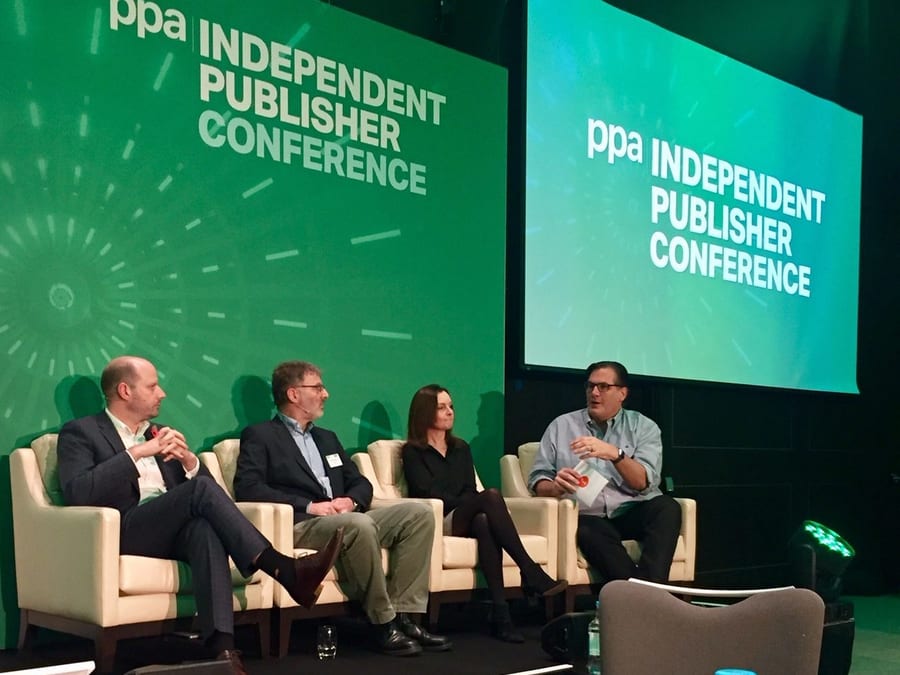|
Getting your Trinity Audio player ready...
|
How can niche publishers grow their business in these turbulent times? Specialist publishers gathered at the PPA Independent Publisher Conference in London on 2 November, to hear from pioneering brands like The Lawyer, Rock Sound and The Drum about how to reinvent their business and develop new revenue streams.
These were 10 smart ideas that I took away from the event.
Specialist publishers have an advantage
Having a tightly defined niche audience, and providing them with exclusive, valuable content is the best route to building engagement via print, digital or events. Specialist editors understand their community and smart publishers can gather valuable intelligence on who they are and how they behave that is valuable both to editors and for commercial partners. In a highly competitive world, niche is a nice place to be.
Focus on building digital subs
The days of free digital content funded by ads are over. Buzzfeed is struggling and Facebook referrals are declining. Led by pioneering news brands like the New York Times, publishers are rediscovering that readers will pay for quality content, delivered digitally. Experts predict that most consumers will end up with four digital content subscriptions: alongside the likes of Netflix, Spotify and news brands, one is likely to be a “passion.” More publishers are moving to reduce reliance on advertising, and ensure their business is sustainable from reader revenues. The Lawyer moved from free to paid in one go, but invested effort in pre-sales among its core readers, and now has built up to 200 corporate subscribers, with 34% of its revenues from paid content.
Move to personalised, dynamic paywalls
Leading publishers like Schibsted are moving away from basic hard paywalls and
Develop new business models
Publishers are already testing out new business models: developing events, creating reader clubs, acting as a creative agency for advertisers, selling merchandise or using affiliate links in content, investing in startups or licensing their brand to partners. Rock Sound has had success with developing “fan packs” including magazines and other exclusive print content, priced at up to £30 and sold online to an international audience of young rock fans.
Rethink print, it’s not dead yet
Print may not be around for ever, but it still delivers profits and has a place in readers’ repertoires, often as a relaxing alternative to screens. The Week Junior by Dennis has grown fast, not least because anxious parents like the idea of their school-age kids consuming content away from a screen. The Lawyer has moved from a weekly print magazine to a monthly themed edition which is more of a long read, while news goes online. Editor Catrin Griffiths feels that her team relished the challenge of rethinking the editorial package. Innovation Consulting’s Juan Senor urged publishers to see their print products as a “bridge to the future” while they build their digital revenues.
Experiment with e-commerce
Many niche publishers are testing out affiliate links on editorial reviews. Dennis has gone a step further with buyacar.co.uk, which uses the online reach and editorial content of their automotive titles to drive buyers to a site where they can purchase and finance their next car. This business is growing at 122% pa and now makes up 40% of Dennis’ total revenue. Nick Flood said Dennis had brought in expertise in e-commerce and car dealerships and invested in content, SEO and customer service. He advised giving e-commerce businesses time to grow: don’t kill them too early!
Test data products, but add insight and analysis
The Lawyer, like many B2B media businesses, has been focussed on developing data products. The first iteration, a global M&A database, LMI, didn’t do as well as expected. Editor Catrin Griffiths now believes that data products need an editorial narrative to gain engagement with demanding audiences, and they now wrap analysis and insight around the data. LMI has also seen investment in user experience, and now subs volumes are growing. The team is convinced that exclusive data is important and are working on a database of commercial litigation to be launched in 2019.
Plan how to replace digital display ads
Digital display is in decline, rates are low and clients are questioning the value as they switch marketing budget to content creation. And Google and Facebook are soaking up the majority of new digital display advertising on mobile. So publishers have to develop new skills, working closely with commercial partners to develop more tailored, content-driven marketing solutions across print, digital and events. This requires a good understanding of what content engages readers, and client marketing objectives. The Drum is showing the way with its content agency, creating written reports, videos and managed events for its clients. This revenue stream is growing at 75% pa and will soon be a third of the entire business.
Get clued up on transaction best practice
As an independent publisher, whether you are a buyer, looking to fill in gaps in your portfolio with targeted acquisitions, or have your eye on a
Learn about digital: hire in specialists
Digital veteran David Gilbey advised investing in digital training for staff and bringing in specialists for all the many digital disciplines, from e-commerce to SEO to app development. Focus on the problems customers want solving and work out if you have the opportunity to create a marketplace, as Spotlight
So plenty of optimism and avenues to pursue for the independent publisher. The key appears to be to use your knowledge of your readers to stay close to their needs and be prepared to test out new products and services. Reduce your reliance on advertising and be ready to rethink your print, as you pursue the prize of digital subscriptions.
Carolyn Morgan, Digital Consultant and Non Exec Director
About the author:
Carolyn Morgan has launched, acquired, grown and sold specialist media businesses across print, digital and live events. A founder of the Specialist Media Show, she now advises media businesses on their digital strategy.
@carolynrmorgan


